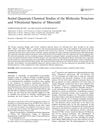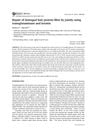Search
for
Sort by
Research
720-750 / 1000+ results
research Schizochytrium Sp. Extracted Lipids Prevent Alopecia by Enhancing Antioxidation and Inhibiting Ferroptosis of Dermal Papilla Cells
Lipids from Schizochytrium sp. help prevent hair loss by protecting hair cells from damage and promoting hair growth.

research Examining the Effect of Notocactus Ottonis Cold Vacuum Isolated Plant Cell Extract on Hair Growth in C57BL/6 Mice
Cactus extract from Notocactus ottonis may help promote hair growth.

research Scaled Quantum Chemical Studies of the Molecular Structure and Vibrational Spectra of Minoxidil
The analysis shows where minoxidil's atoms are likely to react and describes its electronic transitions and behavior with temperature changes.

research Interactions Between Damaged Hair Keratin and Juglone as a Possible Restoring Agent: A Vibrational and Scanning Electron Microscopy Study
Juglone from walnut extracts may help repair damaged hair.
research Polystyrene-b-Poly (Acrylic Acid) Nanovesicles Coated by Modified Chitosans for Encapsulation of Minoxidil
Minoxidil can be effectively encapsulated in coated nanovesicles for potential drug delivery.

research Repair of Damaged Hair Protein Fiber by Jointly Using Transglutaminase and Keratin
Using an enzyme and keratin treatment can significantly repair and strengthen damaged hair.

research Minoxidil And Its Use In Hair Disorders: A Review
Minoxidil effectively treats hair loss, but use cautiously and monitor side effects.

research Secreted Subtilisin Sub3 from Microsporum Canis Is Required for Adherence to but Not for Invasion of the Epidermis
Sub3 is essential for fungus adherence but not for skin invasion.

research The Essential Oils of Chamaecyparis Obtusa Promote Hair Growth Through the Induction of Vascular Endothelial Growth Factor Gene
Essential oils from Chamaecyparis obtusa may help hair grow by increasing a growth-related gene.

research Anabolic-Androgenic Steroids and Cardiovascular Risk
Using steroids can increase the risk of heart problems.

research Reactive Keratin Derivatives: A Promising Strategy for Covalent Binding to Hair
Modified keratin binds better to hair, especially bleached hair.

research Effective Amelioration of Hepatic Inflammation and Insulin Response in High-Fat Diet-Fed Rats via Regulating AKT/mTOR Signaling: Role of Lepidium Sativum Seed Extracts
Lepidium sativum seed extracts helped reduce inflammation and improve insulin response in obese rats on a high-fat diet.
research Applications and Limitations of Lipid Nanoparticles in Dermal and Transdermal Drug Delivery via the Follicular Route
Lipid nanoparticles can help deliver drugs through hair follicles but struggle to penetrate deeper skin layers.

research Nanofiber-Mediated Sequential Photothermal Antibacteria and Macrophage Polarization for Healing MRSA-Infected Diabetic Wounds
The nanofibers effectively treated infected diabetic wounds by killing bacteria and aiding wound healing without toxicity.

research KEBOT: An Artificial Intelligence Based Comprehensive Analysis System for FUE Based Hair Transplantation
The KEBOT system is a highly accurate AI tool for analyzing hair transplants.
research Different Ligands of the TRPV3 Cation Channel Cause Distinct Conformational Changes as Revealed by Intrinsic Tryptophan Fluorescence Quenching
Different ligands change the shape of the TRPV3 ion channel in unique ways.

research Iontophoretic Transdermal Delivery of Finasteride in Vesicular Invasomal Carriers
Finasteride delivery through skin improved using invasomes and iontophoresis.

research Inhibition of 5α-Reductase, IL-6 Secretion, and Oxidation Process of Equisetum Debile Extract as Functional Food and Nutraceutical Ingredients
Equisetum debile extract, especially the ethyl acetate type, may be a promising natural ingredient for anti-hair loss products.

research The Charnoly Body as a Universal Biomarker of Cell Injury
Charnoly bodies could be a marker for cell damage, and certain nutrients and proteins might prevent them, potentially helping with brain diseases and cancer.

research A Novel Regio-Specific Cyclosporin Hydroxylase Gene Revealed Through the Genome Mining of Pseudonocardia Autotrophica
Scientists found a new gene in a bacterium that can modify an immunosuppressant drug, potentially helping to treat hair loss.

research Evidence-Based and Potential Benefits of Metformin in Polycystic Ovary Syndrome: A Comprehensive Review
Metformin helps with menstrual cycles and insulin levels in PCOS but is less effective for hair growth, diabetes prevention, and weight loss, and may improve fertility and reduce diabetes risk.

research CC-Type Glutaredoxins Mediate Plant Response and Signaling Under Nitrate Starvation in Arabidopsis
ROXY proteins help plants respond to nitrate shortage by affecting nutrient sensing and growth.

research The Psychological and Aesthetic Impact of Age-Related Hair Changes in Females
Hair loss affects women's self-esteem; treatments like minoxidil can help.

research Mapping of Cis-Acting Expression Quantitative Trait Loci in Human Scalp Hair Follicles
Researchers identified genes in scalp hair follicles that may affect hair traits and hair loss.

research Results of Low-Level Laser Therapy in the Treatment of Hair Growth: An Egyptian Experience
Low-level laser therapy helps increase hair growth in female pattern hair loss but not in telogen effluvium.

research Risks of Protein Conditioner Application Under the Impact of Heat and Gamma Irradiation in Albino Rats
Repeated use of protein hair conditioner with heat or gamma irradiation can harm skin and hair health in rats.

research Zinc in the Soil and Its Importance for Plants and Human Health: An Integrated Review
Zinc is essential for plant growth and human health, but many soils lack enough zinc, affecting crops and potentially leading to health problems.

research The Effect of a Helmet-Type, Home-Use Low-Level Light Therapy Device for Chemotherapy-Induced Alopecia: Study Protocol for a Randomized Controlled Trial
The trial is testing if a helmet that uses light can prevent hair loss during chemotherapy.

research Assessment of Heavy Metal and Trace Element Levels in Patients with Telogen Effluvium
Heavy metals might contribute to hair loss in Telogen Effluvium.